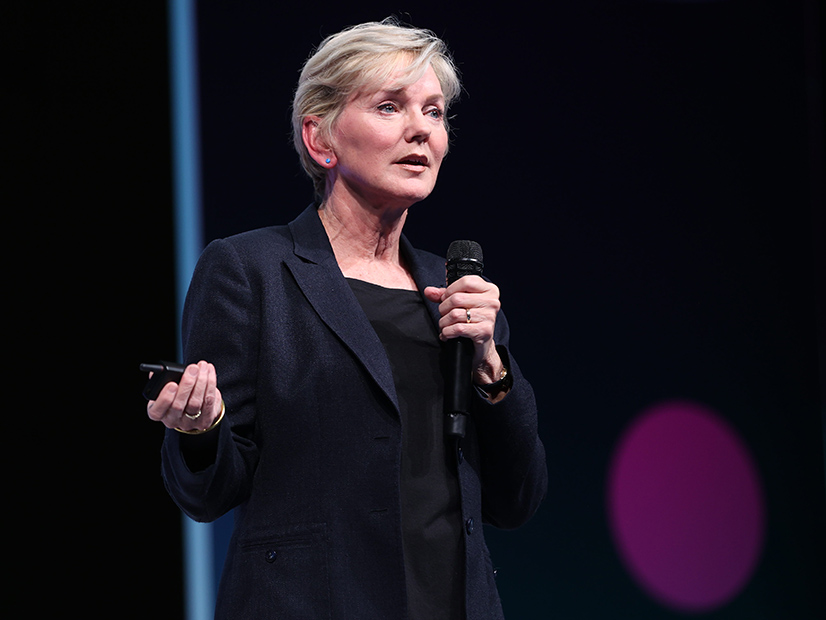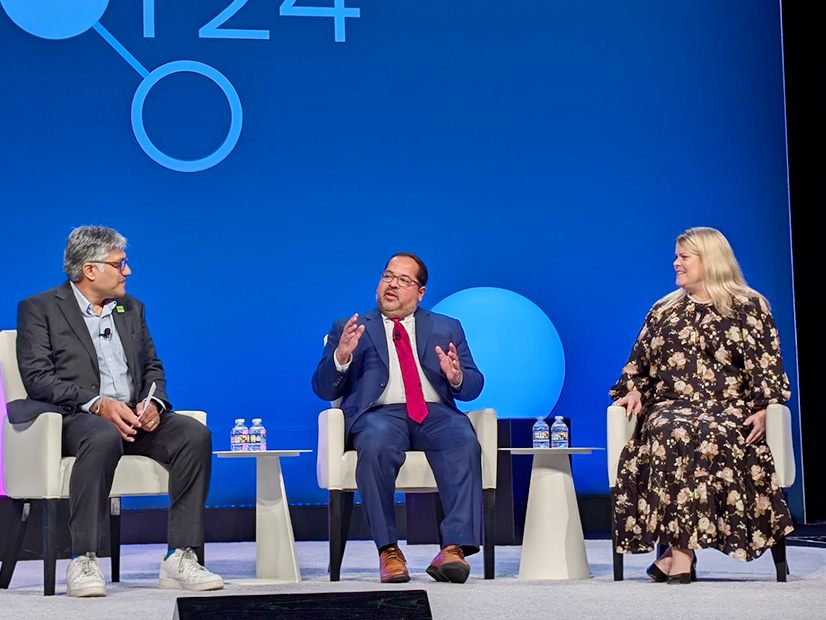
WASHINGTON ― In her four years leading the Department of Energy, Secretary Jennifer Granholm has never been anything less than enthusiastic, if not downright exuberant, about the U.S. clean energy transition, and taking the stage as the closing speaker at DOE’s Deploy 2024 Conference on Dec. 5, she did not disappoint.
DOE was charged with distributing hundreds of billions of federal dollars from the Infrastructure Investment and Jobs Act and the Inflation Reduction Act, and, Granholm said, “98% of the programs that the department was given [under the laws] … have had at least one round of funding go out the door; 98% is amazing in government. The only reason it’s not 100% is because some of the programs require a start date beyond our term. …
“These laws have made investing in America irresistible,” she said. “It has made this energy transition inevitable and inexorable. … It is a transition that is built to last.”
Granholm reeled off a list of examples, beginning with the 60 GW of clean energy that have been added to the grid in 2024, twice as much as has been installed in any other year, with developers “very busy making sure they can get their projects in the ground and take advantage of the [IRA’s 30%] tax credit.”
Those tax credits and other DOE grants and investments have sparked about 300 announcements of new battery storage manufacturing facilities that could halve U.S. dependence on China for lithium, the critical mineral used in most electric vehicle and grid-tied batteries, she said.
“China had dominated this space because they had an industrial strategy, and we now have one to rival them,” Granholm said.
Noting that Deploy likely would be her last major public appearance as energy secretary, Granholm acknowledged the uncertainty ahead as President-elect Donald Trump takes office with an energy agenda heavily weighted toward fossil fuels.
But she sees hope in the fact that about 80% of the federal dollars from the IIJA and IRA are going to red states and districts.
“For every $1 that’s invested by the federal government, $6 are invested by the private sector, and all those dollars are going to red states,” Granholm said. “It would be political malpractice to undo the incentives that are causing all of this economic activity in those red states.”
‘Every Available Electron’
Arguments in defense of the IIJA and IRA were repeated throughout the two-day conference, with speakers linking the economics of clean energy technologies to the industry’s current concerns about demand growth from artificial intelligence, data centers and electrification. (See Podesta: Economics of Clean Energy Have Simply Taken Over.)
Winning the AI race with China has become a national security priority, said Neil Chatterjee, who chaired FERC during the first Trump administration and now is a senior adviser at Hogan Lovells, a multinational law firm. “It’s going to totally upend energy policy and the conventional wisdom that Republicans are for fossil fuels and Democrats are for green energy. …
“We’re going to need every available electron and … every available megawatt,” Chatterjee said Dec. 5, during an onstage conversation with Jigar Shah, director of DOE’s Loan Programs Office, and Heather Reams, president of Citizens for Responsible Energy Solutions, a Republican-leaning advocacy group.
“We’re going to figure out energy efficiency, demand response, virtual power plants,” Chatterjee said. “How can we get grid-enhancing technologies [online]? How can we get greater optimization for our current grid? All of this will be essential to winning the AI race while simultaneously bringing down the cost of electricity for consumers.”
Reams said clean energy entrepreneurs will need to focus on how they can provide cost-effective solutions to meet demand growth and ensure they are meeting with White House staff and with lawmakers on both sides of the aisle.
“I know there’s a lot of talk about President-[elect] Trump being a climate denier, not really valuing reducing emissions,” Reams said. “But let’s get away from emissions and talk about the demand we need. How are you solving the problem? How are you part of the solution?”
Her advice to conference attendees is to come with solutions and pivot a bit on their messaging. “You’re not changing your business but pivoting the words you use,” she said.
Reams said she expects the incoming administration and Chris Wright, Trump’s nominee to lead DOE, will put a pause on IRA and IIJA funding “to get a lay of the land” she said. “But that doesn’t mean that once that pause is there, it’s going to remain.”
Organizations like CRES are in favor of continuing the LPO and other DOE divisions, such as the Grid Deployment Office, which Reams said will be “very, very important, because of all the challenges the grid will face in the coming years.”
Pivoting the Message
DOE appears to be pivoting its message toward Trump’s rhetoric of energy dominance and independence. A video shown at the conference promoted the department as a core driver of “unlocking” U.S. innovation and “unleashing” U.S. clean energy.
Another source of hope for Granholm is that IIJA and IRA funds support clean technologies that have broad bipartisan support, including advanced nuclear, geothermal, carbon and direct air capture, and clean hydrogen.
“Four years ago, who was talking about nuclear?” she said. “We have created a revolution [in] this clean energy. … Small modular reactors, the whole fuel cycle … [are] being developed in the United States. High assay, low-enriched uranium [is] being developed in the United States for small modular reactors; keeping sites online, so making sure they are redeveloped and … that the reactors can have a much longer shelf life.”
IRA and IIJA funding have generated 42 new company announcements in the nuclear space, she said.
That focus on emerging technologies added to a general sense of optimism that federal dollars will continue to flow, said Nathan Kroeker, chief financial officer of Eos Energy, a long-duration storage developer. “It’s been very positive. I was pleasantly surprised,” he said.
“A lot of these people, I think, … either [are] thinking about applying for a loan or a grant, have recently applied for a loan or a grant [or] are eagerly awaiting their conditional commitment,” Kroeker said. “In some cases, maybe they’re looking forward to closing on the loan. Different people I’ve talked to are at different stages, but overall, [they are] very optimistic about this, about the dollars and this public-private partnership, and how do we use that in order to accelerate growth and really differentiate ourselves in the energy space?”
Eos recently finalized a $303.5 million loan guarantee from the LPO, to scale up production of zinc-based, 16-hour batteries. With federal money, “we have turned the corner from being an undercapitalized startup company that everybody was watching to see ― are they going to make it? ― and now we’re a fully funded growth company,” he said. Eos is expanding production at its manufacturing plant outside Pittsburgh, in a former Westinghouse factory.
White House Doesn’t Matter
Aram Shumavon, CEO of Kevala, a grid data analytics firm, shared Kroeker’s optimism, but sees a more complex landscape ahead. “The industry was there in force,” he said during a post-conference interview with NetZero Insider. “The transition has built enough momentum, that the economics of it just make sense. …
“Even in the face of or the prospect of very significant swings associated with some tariffs and things along those lines, and potential significant challenges to some of the programs that create subsidies right now, the economics of zero-marginal-cost fuels and a bunch of technologies that support the evolution of the grid are undeniable,” Shumavon said.
Demand growth also will be a huge driver for clean tech, he said. “We’re seeing a great many people in the industry just looking at the demand for electricity that is coming, and all of that then creates opportunity.”
End-use, customers ― “who, by the way, are also employers and also voters ― are going to be demanding a broad spectrum of products and services from the attendees of that conference. And I think attendees of the conference see that and are excited by the potential. The administration ultimately doesn’t matter in those regards.”
Ending her speech with a symbolic passing of the baton, Granholm agreed, “It does not matter who is in the White House,” because “this transition is happening. This transition is moving forward, with or without a president in the White House that is a clean energy advocate,” she said. “I hope you are willing to take the time and run with it.”




